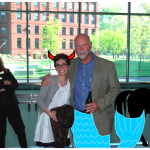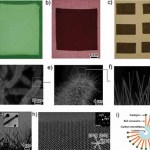Technology
tags: HIV and 'Flu -- The Vaccine Strategy, microbiology, epidemiology, virology, vaccines, medicine, public health, viruses, influenza, HIV, Seth Berkley, TEDTalks, TED Talks, streaming video
Seth Berkley explains how smart advances in vaccine design, production and distribution are bringing us closer than ever to eliminating a host of global threats -- from AIDS to malaria to flu pandemics.
TEDTalks is a daily video podcast of the best talks and performances from the TED Conference, where the world's leading thinkers and doers give the talk of their lives in 18 minutes. Featured speakers…
by Elizabeth Grossman
As of Saturday afternoon, May 29th, ten oil spill clean-up workers had been admitted to West Jefferson Medical Center (WJMC) in Marrero, Louisiana. All but two have been hospitalized suffering from chest pains, dizziness, headaches, and nausea. One crewmember admitted on the 29th had fallen and hit his head on a stair after wave mixed with oil had washed onto a deck, hospital spokesperson Taslin Alonzo told me about three hours after two workers were admitted Saturday. The other, who was working on what Alonzo called "an oil rig," was suffering from hypertension. All…
I've had versions of the same recurring dream/nightmare for decades. While I don't particularly enjoy the dream, it is hilarious to me to reflect on how it has evolved over time to keep up with advances in technology in my waking life.
The dream always involves the urgent need to use a phone at some point. Why I need to use the phone, who I'm trying to contact, how I feel when I'm doing so, what I'm trying to communicate - these circumstances all vary. But commonly, I am unable to complete dialing or entering the number - I cannot put through the call.
When I first began having these…
The reaction to the Venter Institute's synthetic genome transplantation has been decidedly mixed. Is this the beginning of something new and wonderful, the ability to really design organisms from scratch? Is it something more sinister, the beginning of a dark era where techno-corporate (or terrorist) interests can design something that will destroy the environment in catastrophic ways? Is it just a technical advance or a conceptual breakthrough? A philosophical revolution? Is it a Big Deal or big whoop? Synthetic biology has never been just one thing and still has many different goals, with a…
AQIS'10 submission and registration is now open:
==============================
==============================
The 10th Asian Conference on
Quantum Information Science (AQIS'10)
http://www.qci.jst.go.jp/aqis10/
Tutorials: August 27, 2010
Conference: August 28 - 31, 2010
The University of Tokyo, Japan
Submission Deadline (2 to 10 pages): June 14 (Monday), 2010
Notification of Acceptance: July 12 (Monday), 2010
Final version (2 pages): July 30 (Friday), 2010
==============================
==============================
Apologies for cross-postings.
Please send…
Promethean Planet is also using social media like I was discussing in a recent post about how YOU can help the science festival. They also tweet about the festival regularly @planet_tweets if you want to follow them. Thanks Promethean Planet for helping promote the festival and the Kavli Video contest
Check out one of their most recent promotions of the Kavli Video Contest on their Website:
Science is fun! New festival and video contest
USA Science & Engineering Festival As educators, we are constantly encouraging our students to "think outside the box" and "test out their theories," but…
Continuing with the tradition from last two years, I will occasionally post interviews with some of the participants of the ScienceOnline2010 conference that was held in the Research Triangle Park, NC back in January. See all the interviews in this series here. You can check out previous years' interviews as well: 2008 and 2009.
Today, I asked Jason Hoyt from Mendeley to answer a few questions.
Welcome to A Blog Around The Clock. Would you, please, tell my readers a little bit more about yourself? Where are you coming from (both geographically and philosophically)?
I am from the San…
Continuing with the tradition from last two years, I will occasionally post interviews with some of the participants of the ScienceOnline2010 conference that was held in the Research Triangle Park, NC back in January. See all the interviews in this series here. You can check out previous years' interviews as well: 2008 and 2009.
Today, I asked Scott Huler to answer a few questions.
Welcome to A Blog Around The Clock. Would you, please, tell my readers a little bit more about yourself? Where are you coming from (both geographically and philosophically)? What is your (scientific) background?…
Last week, at the SigmaXi pizza lunch (well, really dinner), organized by SCONC, we were served a delicious dish - a lively presentation by Dennis Meredith about Explaining Research, the topic of his excellent new book - in my humble opinion the best recent book on this topic.
His presentation was almost identical to what he presented on our panel at the AAAS meeting in February in San Diego, and you can check out the slideshow (with the audio of his presentation going on with the slides) here.
Dennis and I are friends, and he attended 3-4 of the four ScienceOnline conferences to date and you…
tags: How we Wrecked the Ocean, oceans, fish, fishing industry, introduced species, biological pollution, chemical pollution, climate change, coral bleaching, Jeremy Jackson, TEDTalks, TED Talks, streaming video
In this bracing talk, coral reef ecologist Jeremy Jackson lays out the shocking state of the ocean today: overfished, overheated, polluted, with indicators that things will get much worse. Astonishing photos and stats make the case. So in a nutshell: we've wrecked everything around us: the water, the air, the animals, the climate, and any illusion of world peace we ever had. We're…
On January 15, 1961, the US coastguard raced through the darkness toward a tiny point 84 miles southeast of New York City. There, 28 crew members of Texas Tower 4 were waiting desperately to be evacuated from their station. As huge swells and high winds pounded the hull of the ship, their radios picked up a frantic transmission from the tower: "We're breaking up". And with that, Texas Tower 4 and all of its occupants were pulled beneath the waves.
Built in 1957, the five Texas Towers were intended to become part of the USA's advanced early warning system against Soviet bombers. Named for…
To confine our attention to terrestrial matters would be to limit the human spirit. -Stephen Hawking
Stephen Hawking is in the news today, big time. Why? He says that intelligent aliens almost certainly exist, and that we should definitely not try to contact them. In fact, he argues, we should stay as quiet as possible and try to avoid detection. To quote him:
If aliens visit us, the outcome would be much as when Columbus landed in America, which didn't turn out well for the Native Americans.
We only have to look at ourselves to see how intelligent life might develop into something we…
Night image of Eyjafjallajökull erupting on April 24, 2010. Image courtesy of James Ashworth.
A quick update on the Eyjafjallajökull eruption: Not a lot to report in terms of changes in the volcanic activity at the volcano. The update from the Icelandic Met Office last night sums it up nicely:
Overall activity similar as yesterday. Eruption seen from west in the morning - north crater still active. External water has not affected vent activity much since 18 April. Geologists' field observations (2-10 km from vents) show that explosivity is magmatic and that the tephra produced since 18…
FYI: I'll be appearing next Friday on a panel as part of the "Unruly Democracy: Science Blogs and the Public Sphere" workshop sponsored by the Program on Science, Technology and Society at the Harvard Kennedy School, the Shorenstein Center at the Harvard Kennedy School, and the Knight Science Journalism program at MIT. I'll be appearing with Chris Mooney of the Intersection/Discover on a panel called "Science and the Web."
Now, if you've read the blog for a while, you'll know I'm not a new media cheerleader. I do love new media, but I also have many concerns about its evolving mores. So in…
The New York Times Reader: Science & Technology by Holly Stocking is now out:
Science writing poses specific challenges: Science writers must engage their audiences while also explaining unfamiliar scientific concepts and processes. Further, they must illuminate arcane research methods while at the same time cope with scientific ignorance and uncertainty. Stocking's volume not only tackles these challenges, but also includes extraordinary breadth in story selection, from prize-winning narratives, profiles and explanatory pieces to accounts of scientific meetings and new discoveries, Q…
With health care costs growing without bounds, the medical devices industry and President Obama are hard at work. Not hard at work reducing costs. Hard at work convincing us that the solution to the cost crisis is more technology. Right, Mr. President. And John McCain is a maverick and Sarah Palin is a genius. Almost everyone else believes advanced technology is a significant driver of health care costs and the idea that it will drive down costs is not just a fantasy but steaming pile of crap. That doesn't mean there's no room for innovation to lower costs. On the contrary:
Nobody knows…
As you know, Greer and I at times have our differences in perspective, but I think this week's column is particularly acute, and offers up two point that I think are really essential to grasp when thinking of the future.
The first is that technical feasibility is not all - that technical feasibility rests on a complex bed of other feasibilities. Thus, simply observing that it is technically possible, to, say, create zero impact cities or whatever does not usefully tell us whether we are going to do it. For example, it has been technically possible to eliminate most causes of death in…
To make up for yesterday's frivolity, today I am going to be very, very serious, and deal with weighty serious things. There will be no levity - not from me, and certainly not from my very serious readers. In fact, if I detect signs of levity from any of you, especially those of you with sad proclivities towards levity (Risa, Edson, Lora...I'm talking to you!), you will be publically denounced from my pulpit (I have to go build a pulpit now.)
More practically, I'm going to try and catch up on some things people have asked me to write about, many of which are more serious and require more…
While it might sound science fiction or comic book fodder, scientists have actually developed a kind of wearable protective cloth from T-shirts that contains the same ultra-strong material used to armor tanks.
Modern high-impact military vehicles and bulletproof vests are reinforced with a substance called boron carbide. It's the third hardest material known to man at room temperature, with a hardness of 9.3 on the mohs scale, just a hair behind diamond's hardness of 10. It's hard to imagine how such a rigid material could be comfortable to wear, but scientists have recently developed the…
Science Communicators of North Carolina and Sigma Xi, The Scientific Research Society, present:
"Using Multimedia to Advance Your Research" -- and - "Adventures in Self-Publishing"
By Dennis Meredith, author of Explaining Research: How to Reach Key Audiences to Advance Your Work (Oxford University Press)
April 26, 2010, 6:00 p.m.
Sigma Xi Center, RTP
Dennis Meredith drew a standing-room-only crowd when he talked at the 2010 AAAS meeting about the role of multimedia in research. We've prevailed on Dennis, formerly of Duke University, to reprise his presentation for the home-state crowd.
From…






